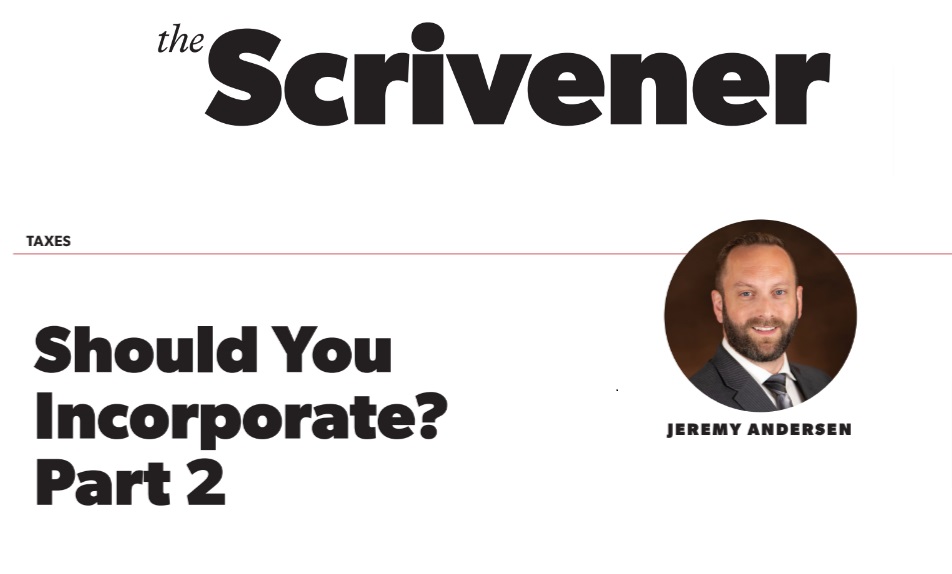Estate Freeze
In the Winter Scrivener (pg 59), I addressed some of the considerations with respect to incorporating a business—a broad topic I will revisit in future issues.
In keeping with our Succession theme in this issue, this article focuses on one tax-planning strategy for exiting an incorporated business: Estate Freezes.
What is an Estate Freeze?
As corporations are separate legal entities from their owners, one of the key qualitative benefits of incorpora- tion is succession—the potential for a family business to be transferred between owners, often generationally to heirs. Without adequate planning, owners of incorporated businesses can often be taken by surprise by the tax consequences of their succession plan to transfer ownership of their successful business to their children.
Usually when a businessowner incor- porates, the owners are issued common shares. For income tax purposes, those common shares are considered “capital” in nature, meaning any gains thereon are taxed as capital gains. Typically, those shares are initially issued with little or no value, meaning any future appreciation in value will be the value of the capital gain.
Generally, when you dispose of property (including a deemed disposition on death), capital gains and associated taxes are triggered. A notable exception is when property is transferred to a spouse.
If you intend to sell or gift property to someone other than your spouse—such as your children, the capital gains tax could be significant. An estate freeze may allow you to limit your accrued capital gain and transfer future capital gains to your intended beneficiaries without triggering immediate tax consequences.
An estate freeze is a tool that can be used to restructure the ownership of your corporation by capping the value of your shares and transferring future growth to the next generation of owners.
An estate freeze is so called, because it refers to a transaction where you lock-in or “freeze” the value of your ownership interest in the company. The frozen portion of thebusiness can typically be used to fund your retirement, while your family members who are successors to your business can begin to work in the busi- ness and contribute to its future growth.
How Does an Estate Freeze Work?
An estate freeze is implemented by a businessowner (the “Freezor”) freezing the value of their private-company common shares that are participating in the growth in value of the company at the current fair market value (FMV).
Those common shares are exchanged for preferred shares that have a fixed value. The newly issued preferred shares can receive dividends (generally at a fixed rate), thereby allowing the holder to participate in the earnings of the company, but the exchange “freezes” their value, meaning the holder does not participate in any future appreciation in value.
The company in turn issues new shares of growth-participating common stock to the beneficiaries, at nominal value. The result is to “freeze” for the original owner the value of the company at the time of the transaction and to pass on any future growth in value of the company to the holders of the newly issued common shares, without any tax consequences.
That strategy allows the Freezor to defer taxes on the frozen value resulting from the growth in the value of the company that occurred up to the date of the freeze, until such time as the Freezor dies or redeems or sells their new preferred shares.
In addition to the benefit of defer- ring the capital gains tax, an estate freeze also allows you to plan for the tax that will be payable upon the eventual disposition of the property, including the deemed disposition on death. Capping your accrued capital gains will allow your advisors to assist you in estimating the tax liability, and in developing strategies for funding it.
When Would You Consider an Estate Freeze?
An important first consideration before implementing an estate freeze is to be sure you don’t require the future growth to fund your current lifestyle needs and testamentary legacy.
- An estate freeze works best when you want to achieve one or more of the following objectives.
Have family members take over the business after you retire or on your death. - Minimize and defer tax.
- Income-split with family members who are in a lower marginal income tax bracket.
- Utilize your lifetime capital gains exemption (LCGE) on the disposi- tion of the common shares in the corporation.
Maintaining Control
As the Freezor, you may want to transfer the future growth of the busi- ness to your children but not relinquish control over the business. That can be accomplished by assigning special voting rights to the new preferred shares issued to you in the estate freeze and/or by limiting the voting rights on the growth shares issued to your family.
Let’s take a look at an example of a simple estate freeze.
Mrs. X incorporated a service business 15 years ago. At the time, she subscribed to 100 common shares with a par value of $100. The business has been successful and has recently been appraised at approximately $500,000.
The valuator feels that based on the current annual rate of return for the busi- ness, her shares should be worth more than $1,000,000 in another 15 years’ time.
Mrs. X is 60 years old and hopes to pass the business on to her son when she retires. Mrs. X feels her savings and investments will allow her to maintain her lifestyle when she retires, without having to rely on any significant income from the business, so she is comfortable in leaving her son the business.
If Mrs. X dies in 15 years, there will be a deemed disposition of all her property, including the shares of her incorporated service business. Those shares would generate a capital gain of approximately $1,000,000.
- By implementing an estate freeze, Mrs. X would be able to freeze all or part of the value of the company, up to the current $500,000 FMV of her original common shares.
- In doing so, she would take back preferred shares worth $500,000 and transfer the future appreciation in the company’s value to her son through new common shares of the company issued to him.
If Mrs. X were to die in 15 years after conducting the estate freeze, the capital gain at that time would be half what it otherwise would have been.
Although Mrs. X will still be liable for tax associated with the frozen amount (up to $500,000), she will not be liable for tax on the future growth of the company. Instead, the tax liability on the future growth will be taxed in her son’s hands when he ultimately sells or otherwise disposes of his shares.
If she so chooses, Mrs. X can also structure the estate freeze in such a way that she retains voting control over the management of the business. Furthermore, the freeze would make it possible to determine the amount of the tax liability with a certain degree of certainty and develop financing strate- gies for it, where applicable, by making use of insurance, for example.
Estate plans are as unique as the individual for whom the plan is being prepared. While different plans can have common elements, it is unlikely any two plans would ever be identical. An estate freeze is but one type of estate plan used for succession.
The Income Tax Act contains various provisions that can be employed as part of an estate-planning strategy, making it one of the most complicated areas of tax planning.
*Readers are strongly encouraged to consult with a specialist before attempting in implement any of the strategies discussed in this article.

